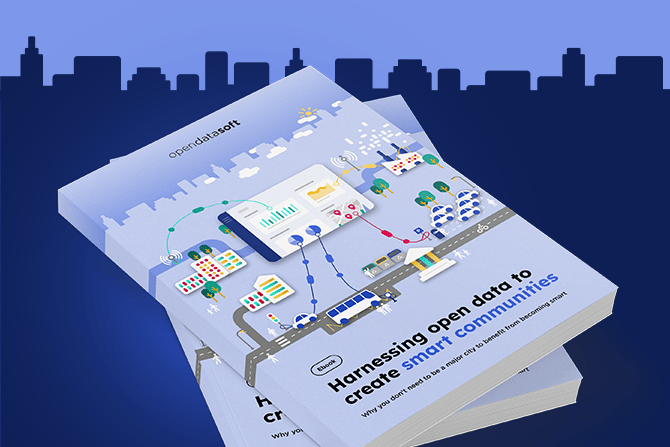How Can Telecommunication Sector Empower Smart Cities and Communities?
“Smart City” has become a buzzword in the last ten years. How can we empower the smart cities and communities? In this article, we discuss how the telecommunication sector can adapt to the urban digital evolution.

“Smart City” has become a buzzword in the last ten years, inundated with various meanings and implications. This loaded phrase has made it challenging for both public and private actors to understand how they can participate in this transformation. This article will answer this question for the telecommunication sector and provide insights on how they can empower smart cities and communities.
If we look at the core of a smart city, the most defining characteristic is connectivity. A city can only be smart if operational decisions are made based on usage data and sensor insights. That means, a smart city first requires a level of connectivity between the users (citizens), the service providers (services and utilities companies & private businesses), and the decision makers (city governments). Understanding the pivotal role of connectivity in a smart city ecosystem, we can easily see several critical ways that telecom companies can empower a smart city.
For City Government: Telecom Companies Can Provide Smart City Solutions
Because of the comprehensive data that telecom operators own, they are the most suitable partner to help a city government design infrastructure and processes that are efficient and cost-effective. Telecom companies can provide the connectivity that city governments require to become smart. And what are the smart city solutions exactly? It can be anything from lighting to traffic, from air quality to government performance. Telecom companies can serve as a bridge between the city government and the wider community while providing a one-stop shop for city data.
Telecom companies have access to a plethora of user data, which can be extremely valuable resources for city governments and urban service providers to make smarter decisions. City government can also take advantage of the telecommunication companies’ offer, by providing data transparency and engaging the wider community. Utility companies like electricity and lighting providers can analyze user needs and reduce wastage. Transport and mobility sector can use traffic data to provide faster, greener navigation management for urban residents. The Smart City ecosystem has a wide range of participants in diverse sectors that telecom companies can serve.
Among the various actors in urban management, a user-friendly open data portal is what connects the dots. GovTech data portal providers like Opendatasoft serve as a platform for telecom operators to share their data, whether it is with city governments, utility companies, or the private businesses. At the same time, Opendatasoft’s standardized service is a time- and money-saver – For city governments, an open data portal provided by the trusted, local telecom company is an attractive offer, especially compared to building and maintaining their own data infrastructure system from scratch.
If you read the news, you will find that advanced economies in the world are participating in the race to 5G. The technology has an incredible potential to reshape the way we live in cities in the next decade, especially transmitting and aggregating the huge amount of sensor data that smart cities produce everyday. Internet-connected devices will be everywhere in our cities, including street lights, sewage systems, public transport, at work, and at home. The connectivity required by the IoT (Internet of Things) ecosystem needs to have a user-friendly, simple platform to showcase all the data, in order to help city governments make day-to-day decisions and improve urban living experiences. Telecom companies as 5G operators are uniquely positioned to help city governments aggregate and showcase city data, to inform citizens, service providers, and private businesses.
For Citizens: Telecom is the Basis for Community Building and Engagement
At the heart of cities are the citizens, the people that live and breathe the urban experiences on a daily basis. Nobody understands the cities’ problems and challenges more than the urban residents. However, in order to engage the citizens’ ideas and harness the community potential, we need trustworthy, publicly-available, and user-friendly data on a unified platform.
The pain points in everyday urban life are often similar regardless of the country: high crime rates, traffic congestion, parking scarcity, environmental pollution, etc. How do we create a safer, greener, and less congested city? Cities from global metropolises to small-sized towns have resorted to open data in order to encourage community-sourced holistic solutions. Open data provides transparent information, which the communities can utilize, analyze, and monitor on-going trends in order to keep us safe.
Mexico City has published their daily-updated violence hotline data during the Covid quarantine. Researchers, journalists and other community members have found that violence against women has risen since the lockdown.
A smaller-sized city in the U.S., Town of Cary, has also utilized data to engage citizens and make their city safer. During the opioid crisis, the Town of Cary collected and published sewage data that can track drug use. Since then, community members and volunteers have come together to organize anti-drug use campaigns and support groups.
The City of Bristol has opened their data on air quality, in order to keep the city on track with national and EU environmental standards. Since then, individual community members have participated by installing low cost sensors at their homes and providing real-time air quality data for the general public.
In the end, smart cities are not just about the technologies, but about the people. To create a safer, greener, and people-friendly city requires a community-sourced, holistic approach. Telecom companies can take advantage of their local recognition and proven networks to provide an open data platform for the community. Publishing reliable, open, user-friendly data allows citizens to monitor community trends, expose risks and challenges in urban spaces, and bring innovations to better our cities.
For Private Businesses: Telecom is the Best Source of Insights
Telecom companies are the best source of insights for private businesses and the local economy: no one understands the consumer needs better than the local telecom operators. Telecom companies have access to user information, location services, and consumer preferences, while having the ability to safeguard privacy and provide non-PII (non-Personally Identifiable Information) for private businesses to make smarter decisions.
Cisco reported that mobile data traffic has grown 17 times in the past five years, and it will triple over the next three years. Mobile data is often labeled the gold mine of the 21st century, but the key question is to find an intuitive visualization platform that will help private companies understand the data. A data portal that is easy to set up, constantly updated, with a variety of specific data points customized to the business needs is essential to translate data into value.
Telecom operators can take advantage of Opendatasoft’s standardized platform and provide a variety of packages for different types of retailers, tourism agencies, and event management etc. The intelligent market research can help answer questions like: “How is my catchment area changing?” “What other events do my visitors attend?” or “How attractive is my tourist destination according to the visitors’ origin?” The insights that telecom operators can provide are not only up-to-date and accurate, but also customizable for different types of business. One of our telecommunication clients SFR has utilized the Opendatasoft portal to create their business insight product: SFR Quickview.
How Can We Help?
Opendatasoft is an established player in GovTech, serving hundreds of returning clients in a variety of use case scenarios.
- Opendatasoft understands cities. We have had extensive experiences serving various levels of government administrations, as well as private city service operators. As a city expert in the open data world, we have the most optimized platform to incorporate within the existing governing structures and regional strategies.
- Opendatasoft is user-friendly. The simple, intuitive platform truly allows anyone to understand, access, and utilize, from data novice to data scientist. The various use cases can be adapted quickly to your needs.
- Opendatasoft is the one-stop shop for businesses. Traditional data scattered across different sources and annexes is extremely hard to use. Our platform allows both internal and external sharing, which can improve business performances and create new product offers.




